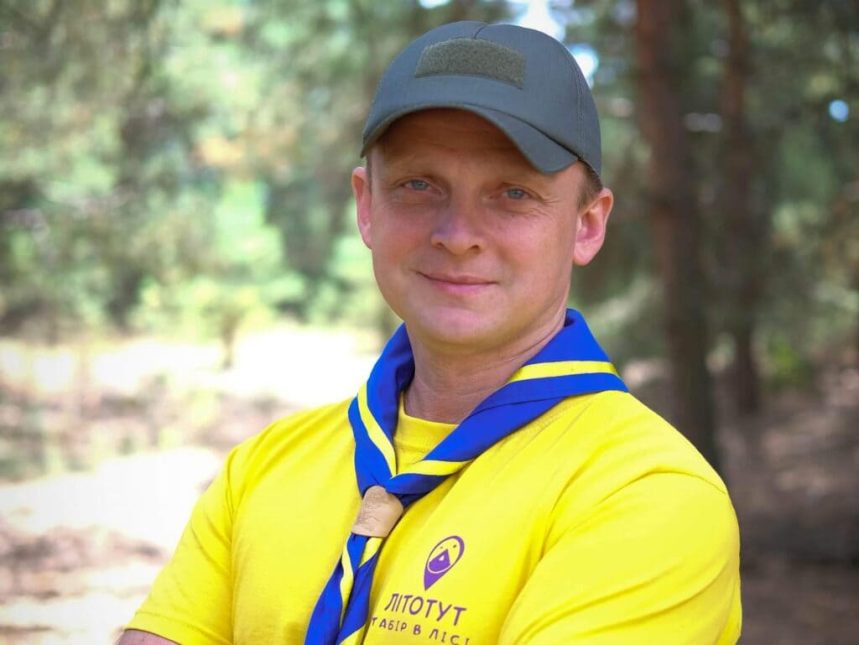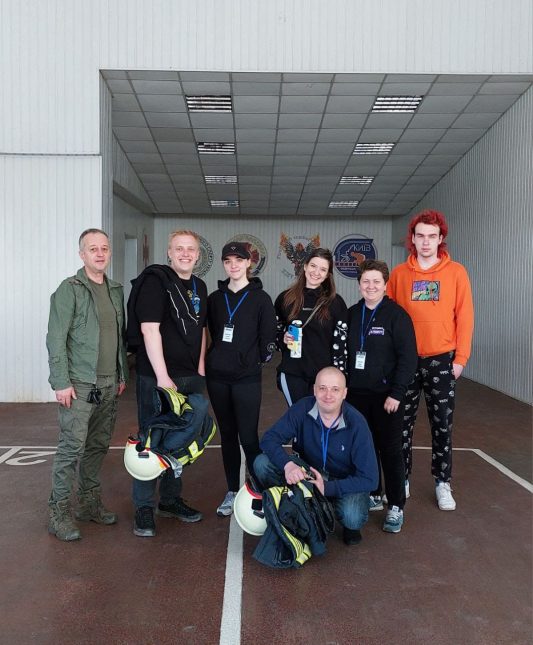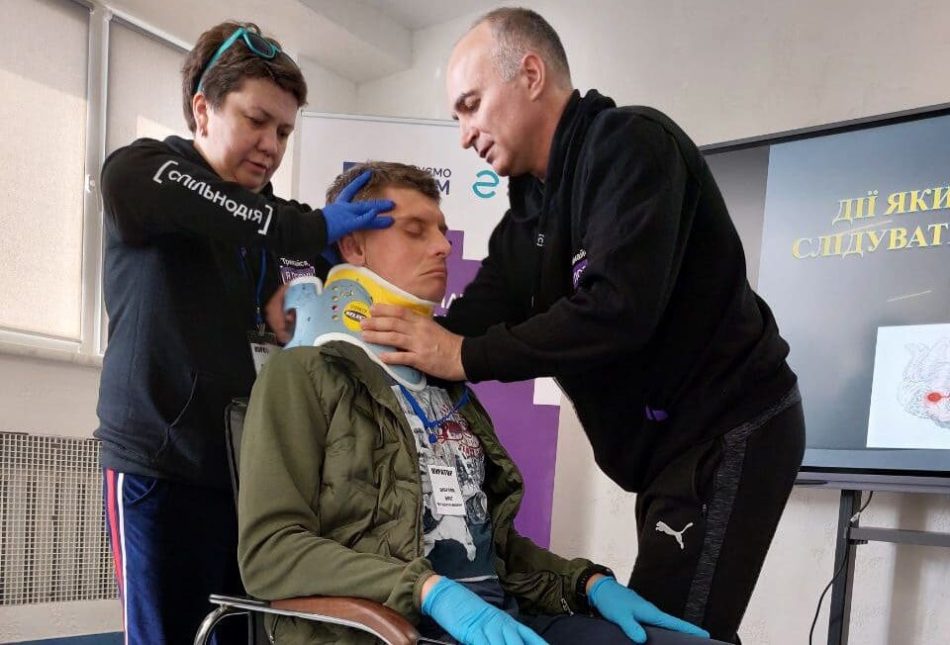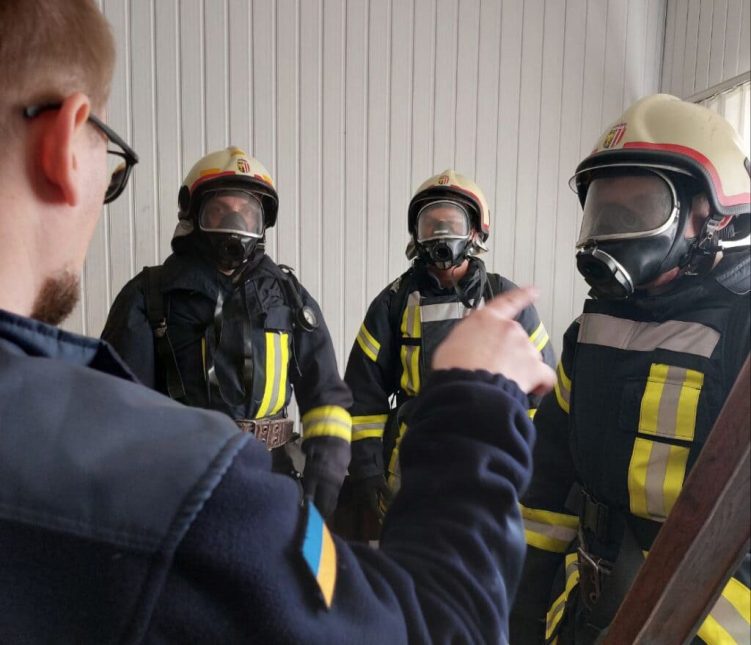
“Sometimes minutes count when you have saved a person’s life”
25/12/2023
Just imagine that you can save someone’s life when commuting, in the subway, or even in the neighbor’s yard. And the graduates of rescue courses do not have to imagine: two weeks of training, and they have the basic skills to aid others in emergencies. For example, the very next day after the certificate awarding, they go to a fire scene in their community or gather a team of like-minded persons and save lives in Kherson after the dam was blown up.
Dmytro Doroshok from the NGO Volunteer Center is convinced that the more there are people with first aid skills, the safer our life is. ShoTam spoke with Dmitro about his experience in volunteering, the importance of not only a sheer desire to help, but also the skills, and the feeling of being involved and needed, even if you are not at the front line.

Me and my friends were at Maidan Nezalezhnosti during the collapse of the USSR
I was born in Mariupol, but lived in Kyiv almost all my life. When at school, I was with those who organized discos, concerts, or camping. It was just the times of a Revolution on Granite (student protests in 1990 in Kyiv on Maidan Nezalezhnosti). We went there with friends, although we were schoolchildren, not students. I remember us with flags, then the Unification Act, protests under the Verkhovna Rada, and Independence. We also participated in all this.
When I was still in school, I joined the scout organization – they went camping. It all started there. Later, I became an instructor and conducted thematic scouting games myself, so when I was a student I was invited to work in social services. I had to find volunteers for the projects and work with them. So that our social projects had an impact on the entire territory of the country, we established a public organization, and in 1998, I became a co-founder of the All-Ukrainian Community Center Volunteer.
With the new organization, I immediately started working on large events involving many volunteers. I already had experience – it is easy and interesting for me to communicate with people.
We had training for volunteers, which they then repeated for their acquaintances in schools, villages, and towns.

Eurovision, football, and evacuation of people abroad
When it was decided that Ukraine and Poland would host the FIFA World Cup in 2012, I already knew that I would volunteer there. I had no idea how, but I knew I would – and that’s just what happened. I managed people in Kyiv as our NGO organized the volunteer part of the event. Also, the major events we were involved in included the Eurovision Song Contest in Kyiv, championships in rhythmic gymnastics, and boxing. The organization of such large-scale events requires a clear system: before the event itself, we spent half a year developing a volunteer management program and training leaders of volunteer teams.
Following the full-scale invasion, our organization got involved in the operations at once – we joined the International Assistance Headquarters for Ukrainians, which included all the country’s public organizations. They worked in three areas: evacuation of people, assistance abroad, and assistance in Ukraine. Each organization and person determined for themselves the exact areas they could be useful – we refocused on helping victims in Ukraine. Foremost, we organized evacuation at checkpoints, because it was very difficult in the first days. We worked along the border in Transcarpathia and helped people crossing it.
Then we transported the necessary items for the Kyiv territorial defense forces: people in the west of the country gathered food and individual equipment, while we loaded the vehicles up and drove to Kyiv. We also began to organize psychological assistance: we recruited volunteers for the Spilno by UNICEF and held camps for IDPs. The country faced new challenges, therefore, we faced the same.
A random person in the crowd does not always know what to do – you have to teach them
In 2023, we created a project to train rescue and fire service volunteers within the framework of the “Spilnodiia” Program implemented by East Europe Foundation. The idea of creating courses on emergency services arose out of a real need: we lacked people. It was necessary to deal with debris after the Russians were forced from the Kyiv region because the occupiers left behind destroyed towns and villages.
When trained employees of the State Emergency Service came to the scene, they knew how to dismantle the debris, where they could go and where they shouldn’t, where they had to get special equipment, and after that, let people act. There were many willing to help the rescuers.
Someone with a great desire to help rushes to the scene where a slab is hanging over their heads and at any moment it can fall and crush everyone under it. They dismantle debris but have no idea whether anyone is under it, which is dangerous. So the problem was that a random person from the crowd could not always ensure qualified assistance.
Therefore, the State Emergency Service decided as follows: they will train all those interested, and these will be able to help more professionally. There were a lot of applications from people who wanted to help on the State Emergency Service website — people from all over Ukraine filled out the form. We chose participants from the Kyiv region because our training center is in Kyiv. We called these people and offered to take the courses.

During six months, 250 people were trained. It lasted two weeks for each group. Topics included firefighting, search and rescue, first aid, and identification of explosive objects. East Europe Foundation in cooperation with the State Emergency Service developed the application “Demining Ukraine” – it has indications of dangerous areas loaded with explosive substances. A trained person knows what these objects look like. Of course, they cannot defuse them, but they can mark a point in this application as potentially dangerous, then call the emergency services, and professionals will come and demine the area.
Following the courses, the participants received state certificates allowing them to join public organizations or be volunteer rescuers in communities.
We had people who received their certificates and the very next day rushed to the fire scene. Some organized themselves in a few hours, took their transport, and went to Kherson after the dam was blown up. And they still go there to help.
There are no such courses now, but this training can be repeated in other regions. We still decide on how to organize and expand the network.
The more people know about first aid, the safer it is to live in our country
Emergencies or risky situations occur constantly even in peacetime.
Professional rescuers cannot always come in time, and searching for a missing child, for example, requires a very large number of people who can cover vast areas. So there is always a need for people who can do something professionally.
We are moving towards the reform of the State Emergency Service so that volunteer rescuers are trained in territorial communities. When a fire breaks out, those closest to the scene are the first to respond. They have the uniform, necessary skills, and equipment to put a fire out or carry out a rescue operation.
This is unpaid work, but if any volunteer makes 40-50 trips during the year, they can get a monetary reward. And it’s still cheaper than to deal with the consequences of a fire if firefighters are too far away. This specifically applies to remote communities and villages.

Such a reform was introduced in Poland. Of course, it would be nice if it is implemented here. Why so? First, it is more efficient. Second, the more people know about first aid and can provide it in a qualified manner, the safer it is to live in such a country. Especially given our situation and our neighbors. Therefore, it is an important security element for the whole society. This also applies to peacetime.
Imagine the situation: you are driving a car and see that something has happened ahead of you. You took the courses, so you stopped the car and provided aid. Right there. Sometimes minutes count, and you have saved a person’s life.
Everyone should do the things they know and can do. I have the related experience — I can develop and implement projects. People inspire me. I met a lot of people who are not at the front line but who are ready to do something and help. They should be involved so that they do not feel useless nowadays. I know some flee from the occupation and want to be useful. Some join the armed forces, and some wish to volunteer. There are a lot of such people, and we should offer them fulfillment.
The article was prepared within the framework of the “Volunteers: Working for Peace” special project. It includes several stories about volunteers – firefighters, doctors, and rescuers.
The special project was implemented as part of the “Spilnodiia” Program, executed by East Europe Foundation in partnership with the Ukrainian Center for Independent Political Research and NGO Together Against Corruption and financed by the European Union.
Translated from the original article on #ShoTam
You can watch a video about 18-year-old student Kim Pennock, who became a rescuer of the State Emergency Service, here.
Contacts
01033, Kyiv, 83 Saksaganskogo Str., 3rd floor
Office hours: Mon–Fri from 9:00 to 18:00
Stories
-
Katarina Mathernova: If Ukraine had a human face and a human spirit, it would be 10-year-old Roman Oleksiv
-
A regional mission to drive social entrepreneurship: the story of Ksenia Kosukha
-
EU restores safe water supply for 100,000 Ukrainians affected by war
-
Promoting IT during the war: Lviv IT cluster and how EU4Digital helps
-
Frontline digitalisation: Kharkiv IT Cluster collaborations
-
How EU4Youth is driving opportunity and success among young Ukrainians